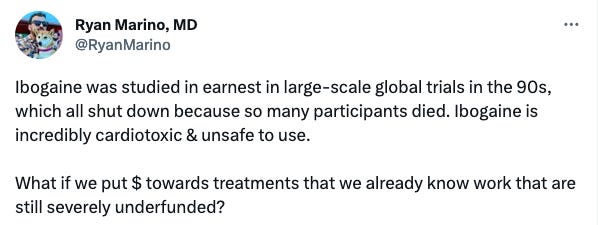California psychedelics legalization bill advances, Kentucky to spend $42 million on ibogaine research; DC’s psychedelics lobbyists; Is informed consent possible?
Plus: Winnipeg shroom dispensary raided, and psilocybin for irritable bowel syndrome
Happy Friday, and welcome back to The Microdose, an independent journalism newsletter brought to you by the U.C. Berkeley Center for the Science of Psychedelics.
The State of Psychedelics
Last week, California senators narrowly passed Senate Bill 58 in a 21-16 vote. The bill would make it legal for people over 21 to possess, prepare, obtain, or transport psychedelic substances including mescaline, DMT, ibogaine, and psilocybin. Sale of the substances would remain illegal. (For more on SB 58’s history, read our 5 Questions for California state senator Scott Wiener, the bill’s sponsor.) The bill now heads to the State Assembly.
On Wednesday, Kentucky’s Opioid Abatement Advisory Commission held a press conference announcing $42 million in state funds to study ibogaine as a treatment for opioid addiction. Military veterans and members of their families spoke, including veteran Navy Seal Marcus Capone, the founder of the psychedelic organization VETS, who talked about how ibogaine helped treat his addiction.
As the news broke, some expressed skepticism about the state’s funding plans given ibogaine’s history of inducing serious adverse effects in users, and in some cases, death. For example, Ryan Marino, a medical toxicologist and assistant professor at Case Western Reserve University School of Medicine laid out his concerns in a Twitter thread:
DC’s psychedelics lobbyists
POLITICO’s Influence newsletter recently reported on multiple DC lobbying firms representing various psychedelics organizations that are pushing for rescheduling psychedelics and increased research access to the drugs. Non-profit organizations, including Reason for Hope and the Healing Advocacy Fund, have hired lobbyist groups. Former Senate minority leader Tom Daschle’s lobbying firm, The Daschle Group, is working with Reason for Hope and tells POLITICO that they are working in support of the Breakthrough Therapies Act, a bipartisan bill introduced in February that proposes updates to the Controlled Substances Act that would move substances in Schedule I that FDA has granted “breakthrough therapy status” into Schedule II. Currently, the act would only affect the scheduling of MDMA and psilocybin.
Want the latest psychedelics news? Subscribe! (It’s free!)
Is informed consent possible with psychedelics?
Informed consent is a key component of ethical medical practice and research; patients must receive information about the potential harms and benefits involved with participating in treatment. But can participants truly consent to psychedelics? In a recent paper published in Frontiers in Psychology, University of Oxford psychiatrist Edward Jacobs writes that the effects of taking psychedelics are “epistemically inaccessible” before people take them. It’s not possible for people to fully comprehend what they’re saying ‘yes’ to when they agree to take psychedelics in part because the experience is often transformative.
By way of comparison, Jacobs uses examples of other impossible to predict states of being such as becoming a parent or becoming a vampire. “These central, life-defining choices intractably involve a leap of faith — a commitment to discovering the unknown,” he writes. “The discovery is not simply of what it will be like to have some novel experience, but also, and more pressingly, the discovery of who you will become, should the experience give you attitudes, a worldview, and values that are at the point of the choice alien to you.”
Winnipeg shroom dispensary raided
Selling psilocybin mushrooms is illegal in Canada, but dispensaries have popped up across the country. In Winnipeg, Manitoba, a store called Magic Mush opened in mid-May, and its owner told CTV News that the business had other locations in Toronto and Ottawa. The manager of the store told CTV that he was prepared to be arrested. Last week, less than a week after Magic Mush opened, Winnipeg police arrested two people and charged them with trafficking psilocybin. According to CBC, police also seized $10,000 worth of psilocybin mushroom products.
Psilocybin for irritable bowel syndrome
In a press release, Canadian psychedelic biotech company Tryp announced that they’ve submitted an Investigational New Drug (IND) application to the U.S. Food and Drug Administration for a phase 2a clinical trial which will study the efficacy of psilocybin-assisted therapy in treating irritable bowel syndrome. Tryp’s CEO Jim Gilligan says the study “will examine how psilocybin-assisted psychotherapy may alter brain networks involved in chronic abdominal pain and gastrointestinal-specific anxiety in patients with IBS to improve their symptoms.” The company is working in collaboration with researchers at Harvard Medical School and Massachusetts General Hospital, who will be measuring any changes in participants’ abdominal pain and “brain connectivity and responses to pain.”
In the Stanford Daily, student journalist Sarayu Pai recounts Stanford’s role in novelist Ken Kesey’s career and as an epicenter for psychedelic culture in the 1960s.
Detroit’s Metro Times reports on Julie Barron and Jodou Baqui, members of Decriminalize Nature Michigan and founders of a new psychedelic therapy training program in their state. “Barron says that decriminalization is happening across the state and she wants to prepare practitioners for when that happens,” the Metro Times reports.
Expectancy effects and blinding are perennial problems in psychedelic research design. In WIRED, Shayla Love explains the history of blinding and placebo in randomized controlled trials, and talks with researchers looking for ways to control for bias in study data. One method involves giving participants midazolam, a sedative that causes forgetfulness, after they receive a dose of psilocybin.
Bloomberg asks: Can workplace ketamine retreats improve vibes in the office?
You’re all caught up! Have a great weekend. We’ll be back in your inbox on Monday with a new issue of 5 Questions.
If you know anyone who might like the latest on psychedelics in their inbox, feel free to forward this to them, or click below.
Got tips? Email us at themicrodose@berkeley.edu.









